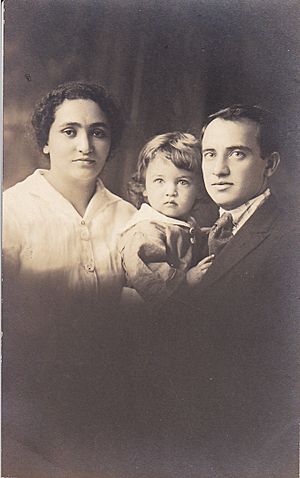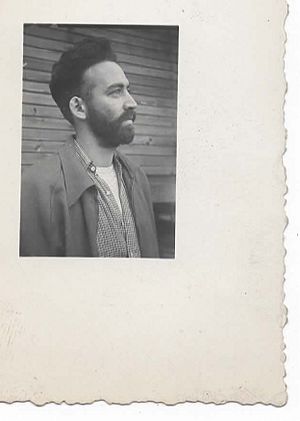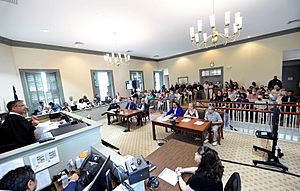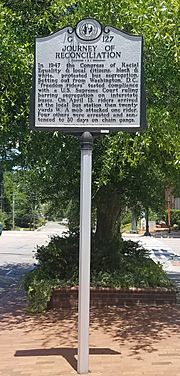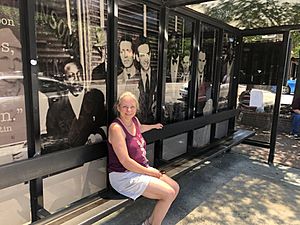Igal Roodenko facts for kids
Quick facts for kids
Igal Roodenko
|
|
|---|---|
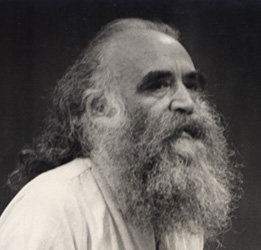 |
|
| Born | February 8, 1917 New York City, New York, USA
|
| Died | April 28, 1991 (aged 74) New York City, New York, USA
|
| Nationality | American |
| Alma mater | Cornell University |
| Known for | War Resisters League; Committee for Nonviolent Revolution; Journey of Reconciliation |
Igal Roodenko (born February 8, 1917 – died April 28, 1991) was an American civil rights activist and pacifist. A pacifist believes in solving problems without violence. He dedicated his life to promoting peace and justice.
Contents
Early Life and Beliefs
Igal Roodenko was born in New York City on February 8, 1917. His parents, Morris and Ida, came from Ukraine. They moved to New York in 1916. Igal grew up in a home that believed in Zionism (supporting a Jewish homeland) and Socialism (a system where the community owns and controls resources).
From a young age, Igal decided to become a vegetarian. His whole family followed his example. He attended Townsend Harris High School in Manhattan. Later, he studied horticulture at Cornell University. He first planned to use his skills in Palestine. However, at university, he became a strong pacifist. He then decided to stay in the United States. He realized his belief in peace was more important than nationalism.
Igal was greatly inspired by Mahatma Gandhi. Gandhi's peaceful protests, known as civil disobedience, influenced Igal's life. These ideas helped shape the Journey of Reconciliation, a key event in his life.
Standing Up for Peace in Wartime
During World War II, Igal was a Conscientious objector. This means he refused to join the military because of his strong beliefs against war. He was very active in opposing Hitler before the U.S. joined the war. But he did not believe in forced military service. Because of his beliefs, he was sent to federal prison for 20 months.
Early in the war, he was sent to a camp in Colorado. There, he was supposed to do public service instead of military duty. But Igal's principles led him to refuse to work. This led to his arrest and imprisonment. He and other conscientious objectors went on a hunger strike in 1946. They wanted to bring attention to people who refused to fight in the war. Igal was not released from prison until January 1947.
After his release, Igal continued his activism. He lived in New York City. He became an early member of the Committee for Nonviolent Revolution. This was a pacifist group started in 1946. Other important members included Bayard Rustin.
For many years, Igal worked as a printer. He even had his own print shop. He became deeply involved with the War Resisters League (WRL). This is a pacifist organization. He served on their main committee for 30 years. From 1968 to 1972, he was the Chairman of the WRL. He later sold his print shop. He then spent the rest of his life working for the WRL. He traveled widely, speaking about peace and justice. He spoke at schools, universities, and rallies. He was often arrested during his travels for his peaceful protests.
Igal was a great speaker and storyteller. In 1974, he said that humanity had only a few generations to learn to live peacefully. He believed that if we did not learn to handle conflicts without violence, we might destroy ourselves. He said, "To me, the key word is non-violence."
The Journey of Reconciliation
In April 1947, Igal Roodenko took part in a historic event. It was called The Journey of Reconciliation. Eight Black men and eight white men went on a two-week bus trip. They traveled from Washington, D.C., into the southern U.S. This trip was organized by the Fellowship of Reconciliation (FOR) and the Congress of Racial Equality (CORE).
The group sat together, Black and white, side-by-side. They wanted to test a new Supreme Court decision. This decision said that segregation on buses traveling between states was against the law. In some areas, local laws still supported segregation.
Arrest and Impact
Four riders were arrested in Chapel Hill, North Carolina. They were Bayard Rustin, Igal Roodenko, Joe Felmet, and Andrew Johnson. At their trial, Rustin and Roodenko were found responsible. Rustin was sentenced to 30 days on a North Carolina chain gang. A chain gang was a group of prisoners chained together while working.
The judge gave Igal a harsher sentence. He sentenced Igal to 90 days on a chain gang. This was three times longer than Rustin's sentence. The judge made a prejudiced comment about Igal being Jewish and from New York.
On June 17, 2022, something important happened. Judge Allen Baddour officially dismissed the charges against the four Freedom Riders. This happened 75 years after their arrest. Family members of the activists were there. Renee Price, a local official, learned that the charges had never been dropped. She said the men were arrested for violating laws that were themselves a violation of human dignity and freedom.
Judge Baddour said, "We failed these men in Orange County, in Chapel Hill." He apologized for the injustice. He said they were correcting a wrong in public. He wanted to shine a light on this part of history.
Many people spoke at the special court session. They included legal officials, the mayor, and civil rights leaders. Walter Naegle, Bayard Rustin's partner, spoke. He said the Journey of Reconciliation was about speaking truth to power. It was about confronting injustice peacefully.
Igal Roodenko's niece, Amy Zowniriw, also spoke. She said Igal devoted his life to making the world better. He often took risks for his beliefs. She shared that his favorite thing was to give a speech.
The documentary You Don't Have To Ride Jim Crow tells the story of the Journey of Reconciliation. Seven of the original riders reunited for the film. They visited the places where events happened almost 50 years before. They recalled attacks by mobs and their time in jail. The film also shows how the participants continued to contribute to civil rights.
Igal Roodenko was arrested many other times in his life. In 1962, he led a peace rally in Times Square. He protested against the mistreatment of people who disagreed with the government in the Soviet Union. He also protested against Cornell University investing in South Africa during Apartheid. In 1987, he was arrested in Poland while trying to connect with Polish activists. He once said that if being a pacifist were easy, "any schmo could be a pacifist." This meant it takes courage and effort.
Igal Roodenko passed away on April 28, 1991, from a heart attack.
Awards
Igal Roodenko received the War Resisters League Peace Award in 1979. This award recognized his lifelong dedication to peace.
Images for kids
 | Percy Lavon Julian |
 | Katherine Johnson |
 | George Washington Carver |
 | Annie Easley |


